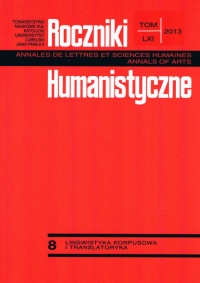Termin portio populi Dei w Kodeksie Prawa Kanonicznego z 1983 roku i jego tłumaczenia na język polski i francuski
Abstrakt
The purpose of this article is the term portio populi Dei in the Code of Canon Law of 1983 and its translation in the Codes in French and Polish. The term portio populi Dei is used in CCL/83 only eight times—in a can. 369 , 370, 371, 372, 473, 495 and 512, always in relation to a particular Church. The Polish version CCL/83 this term has been translated as część Ludu Bożego and the French translation as la portion du peuple de Dieu. In the French version, the word la portion occurs in the same context and amount as in the Latin text, while the Polish część appears in CCL/83 more often (51 times) and in different context. In the CCL/83 term portio populi Dei has been applied by the legislature only in relation to a particular Church or more accurately, the diocese (can. 369, 372, 473, 512 § 2), the territorial prelature and territorial abbey (can. 370), the vicariate apostolic, apostolic prefecture and apostolic administration (can. 371). The translation of this term into Polish as część Ludu Bożego would mean that there is one people of God, who at various locations around the world is divided into parts, which result in the dioceses or the other particular Churches. This understanding of the diocese does not match the council Vatican II or the intention of the legislature. Seems problematic, so the use of the Polish version of the Code, the term część in Latin term portio, although it is in the range of meaning. More appropriate term seems to occur in Polish, the word porcja. The article presents the inaccuracy of the translation of the adjective certa in the Polish version of the Code.
Le terme portio populi Dei dans le Code de Droit Canonique de 1983 et sa traduction en polonais et en français
Le but de cet article est l’analyse du terme portio populi Dei dans le Code de droit canonique de 1983 et sa traduction en français et en polonais. Le terme portio populi Dei est utilisé en CDC/83 seulement huit fois (can. 369, 370, 371 , 372, 473, 495 et 512), toujours par rapport à une Église particulière. Dans la version polonaise du CDC/83 ce terme a été traduit par część Ludu Bożego. Dans la version française, il est traduit par portion du peuple de Dieu. Le problème principal ce sont donc les équivalents du mot latin portio. En français il y a deux mots portion et partie qui sont employés dans le même contexte et en même quantité que dans le texte latin. En polonais część apparaît dans CDC/83 plus souvent (51 fois) et dans des contextes différents. Dans le CDC/83 terme portio populi Dei a été appliqué par le législateur que par rapport à une Église particulière, ou plus exactement, le diocèse (can. 369 , 372, 473, 512 § 2), la prélature territoriale et l'abbaye territoriale (c. 370), le vicariat apostolique, préfecture apostolique et administration apostolique (can. 371). La traduction de ce terme en polonais comme część Ludu Bożego signifierait qu'il existe un seul peuple de Dieu, qui, à divers endroits dans le monde est divisé en parties, et qui se réfère aux diocèses ou aux autres Églises particulières. Cette compréhension du diocèse ne correspond pas au Concile du Vatican II, ni à la volonté du législateur. Le mot część dans ce terme est donc discutable. Les auteurs de l’article proposent le mot plus approprié dans ce contexte : porcja. L'article présente aussi l’inexactitude de la traduction de l’adjectif certa dans la version polonaise du Code.
Bibliografia
Coccopalmerio Francesco, 2013,«Il concetto di parrocchia nel CIC 1983», [in:] Parafia w prawie kanonicznym i w prawie polskim, [éds.] S. L. Głódź, J. Krukowski, M. Sitarz, Lublin, s. 7-37.
Gerosa Libero, 2003, Interpretacja prawa w Kościele. Zasady, wzorce, perspektywy, Kraków.
Góralski Wojciech, 2006, Lud Boży. Kościelne prawo osobowe, Częstochowa, s. 149-155.
Guitérrez J.L, 2011, «Kościoły partykularne i ustanowiona w nich władza», [in:] Kodeks Prawa Kanonicznego. Komentarz, [éds.] P. Majer, Kraków, s. 336-338
Jougan Alojzy, 1992, Słownik kościelny łacińsko-polski, Warszawa.
Kroczek Piotr, 2010, «Tłumaczenie kościelnych tekstów prawnych – aspekt historyczny», [in:] Annales Canonici 6/2010, Kraków, s. 213-224.
Krukowski Józef, 2004 ,«Kościół powszechny a Kościoły partykularne» [in:]: Kościół partykularny w Kodeksie Jana Pawła II, [éds.] J. Krukowski, M. Sitarz, Lublin, s. 28.
Krukowski Józef, 2006, « Partykularne Kościoły», [in:] Leksykon teologii pastoralnej, [éds.] R. Kamiński, Lublin, s. 595.
Krukowski Józef, 2005, «Kościoły partykularne» [in:] Komentarz do Kodeksu Prawa Kanonicznego. Księga II. Lud Boży. Część I. Wierni chrześcijanie. Część II. Ustrój hierarchiczny Kościoła, [éds.] J. Krukowski, Poznań, s. 217-229
Le petit Larousse illustré 2012, Editions Larousse, Paryż, s. 1408.
Manzanares J., 1989, «Les Eglises particulières et leurs autorités», [in:] Code de droit canonique annoté, Paryż, s. 258-259.
Ramos Francisco, 2000, Le Chiese particolari e i loro raggruppamenti, Rzym, s. 33-36.
Renken John, 2000, «Particular Churches and their groupings», [in :] New commentary on the Code of canon law, [éds.] J. Beal, J. Coriden, T. Green, Nowy York, s. 501-510
Sitarz Mirosław, 2013, Competences of Collegial Organs in a Particular Church in the Exercise of Executiive Power According to the Code of Canon Law of 1988, Lublin, s. 16-22.
Zając Paweł, 2013, «Pozycja prawna ordynariatów personalnych dla anglikanów powracających do pełnej jedności z Kościołem katolickim», [in:] Biuletyn Stowarzyszenia Absolwentów i Przyjaciół Wydziału Prawa Katolickiego Uniwersytetu Lubelskiego, t. VIII, 10 (2) 2013, s. 111-137.
Copyright (c) 2013 Roczniki Humanistyczne

Utwór dostępny jest na licencji Creative Commons Uznanie autorstwa – Użycie niekomercyjne – Bez utworów zależnych 4.0 Międzynarodowe.





